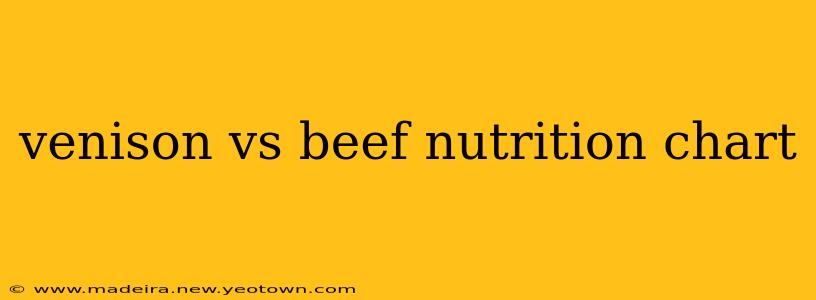The aroma of grilling meat, the satisfying chew, the rich flavor – whether it's venison or beef, these are culinary experiences many crave. But beyond the deliciousness lies a significant nutritional difference. This isn't just a battle of taste; it's a comparison of nutritional powerhouses. Let's dive into the details, comparing venison and beef side-by-side to help you make informed choices about your diet.
This isn't just about calories; we'll unpack the differences in protein, fat, vitamins, and minerals, exploring why one might be a better fit for your individual dietary needs than the other. Our journey will answer some frequently asked questions that often pop up when comparing these two popular meats.
Venison vs. Beef: A Nutritional Comparison
To truly understand the differences, let's look at a general nutritional comparison. Remember that the exact nutritional values can vary based on the cut of meat, the animal's diet, and how it's prepared. This chart provides a general overview:
| Nutrient | Venison (3 oz) | Beef (3 oz) |
|---|---|---|
| Calories | ~180 | ~250 |
| Protein (grams) | ~26 | ~22 |
| Fat (grams) | ~5 | ~18 |
| Saturated Fat (g) | ~2 | ~8 |
| Cholesterol (mg) | ~80 | ~80 |
| Iron (mg) | ~2 | ~3 |
| Zinc (mg) | ~5 | ~5 |
| Vitamin B12 (mcg) | ~3 | ~3 |
Note: This is a simplified comparison. Specific values vary widely depending on factors mentioned above. Always consult a nutrition label for the most accurate information for the specific product you are consuming.
Is Venison Healthier Than Beef?
This is a common question, and the answer isn't a simple yes or no. Venison generally boasts a lower calorie count and significantly less fat than beef. This lower fat content, especially saturated fat, can be beneficial for heart health. The lean nature of venison makes it a preferred choice for those watching their weight or following a low-fat diet. However, beef offers comparable amounts of essential nutrients like iron and B12.
What are the Health Benefits of Eating Venison?
Venison's lean profile translates to several health benefits:
- Weight Management: Lower in calories and fat, it can aid in weight loss or maintenance.
- Heart Health: Reduced saturated fat contributes to a healthier cardiovascular system.
- Nutrient-Rich: Provides essential nutrients like iron, zinc, and vitamin B12.
What are the Health Benefits of Eating Beef?
Despite having more fat, beef still offers several advantages:
- Excellent Protein Source: Crucial for muscle building and repair.
- Nutrient-Rich: Contains essential vitamins and minerals, like iron and zinc, important for overall health.
- Versatile: Used in countless culinary traditions around the world.
Is Venison Lower in Cholesterol Than Beef?
The cholesterol content in both venison and beef is relatively similar, making cholesterol content a less significant differentiator between the two. While both meats contain cholesterol, the impact on individual cholesterol levels can vary based on other dietary factors and individual health conditions.
Which Meat is Better for Weight Loss?
For weight loss, venison generally has an edge. Its lower calorie and fat content make it a more suitable choice for those aiming to reduce their calorie intake. However, portion control is key regardless of the meat choice.
Conclusion: Choosing Between Venison and Beef
The choice between venison and beef ultimately comes down to personal preference, dietary needs, and culinary goals. Venison offers a leaner, lower-calorie option, ideal for those prioritizing weight management and heart health. Beef, while higher in fat, provides an excellent source of protein and essential nutrients. Both meats offer valuable nutritional contributions and can be incorporated into a balanced diet. The key is moderation and mindful consumption, regardless of which you choose.

